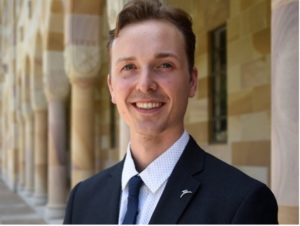Undergrad students join the CCEO for a summer of Earth Observation
The CSIRO Centre for Earth Observation was very happy to have its first two CSIRO Undergraduate Vacation Scholars during the summer of 2020/2021. The prestigious scholarships, which are highly sought after, run over the Australian summer holidays and offer high achieving and promising undergraduate students the opportunity to collaborate with leading CSIRO scientists in our world class facilities.
Tristan Ward joined the SAR Science Initiative team to work with CCEO Satellite Operations and Data Manager, Amy Parker, in Perth. Tristan is a software engineering student completing his Masters at the University of Western Australia, his undergraduate degree was in physics and he is due to graduate mid 2022 with a thesis in Robotics.

Tristan’s project focussed on assessing Australian bushfires using the Synthetic Aperture Radar (SAR) satellites Sentinel 1 and NovaSAR-1. He undertook a training course in SAR data and then used change detection and machine learning algorithms to map fires that occurred in Tumbarumba (NSW) and Fraser Island (QLD). Tristan was new to Earth Observation and was surprised to learn that lots of satellite imagery is free and easy to access. Speaking of SAR he said:
“I believe it will become an essential tool for monitoring the risk, location, and impact of bushfires”.
Franziska Knappe worked alongside CCEO Director Alex Held and the CSIRO Oceans and Atmospheres team based in Brisbane. Franziska recently graduated with a Bachelor of Science (Biological Sciences) with a minor in Ecology and Spatial Science from the Queensland University of Technology. She is looking to start a Masters or Honours project in remote sensing or spatial science this or next year.

Franziska’s project used Earth Observation to assess environmental and economic effects of the COVID-19 lockdown. Her work has focussed on a water quality assessment in the Port Phillip bay region near Melbourne to determine if there is a relationship between the economic downturn associated with lockdown and the turbidity of water.
“The effects of the COVID lockdown related to environmental recovery have been found all over the world“, said Franziska. “The potential of using remotely sensed earth observation data to make inferences on large scale processes on earth is exciting”.
We thank both Franziska and Tristan for their great work over the summer on these important topics and wish them well in their future studies and work.
